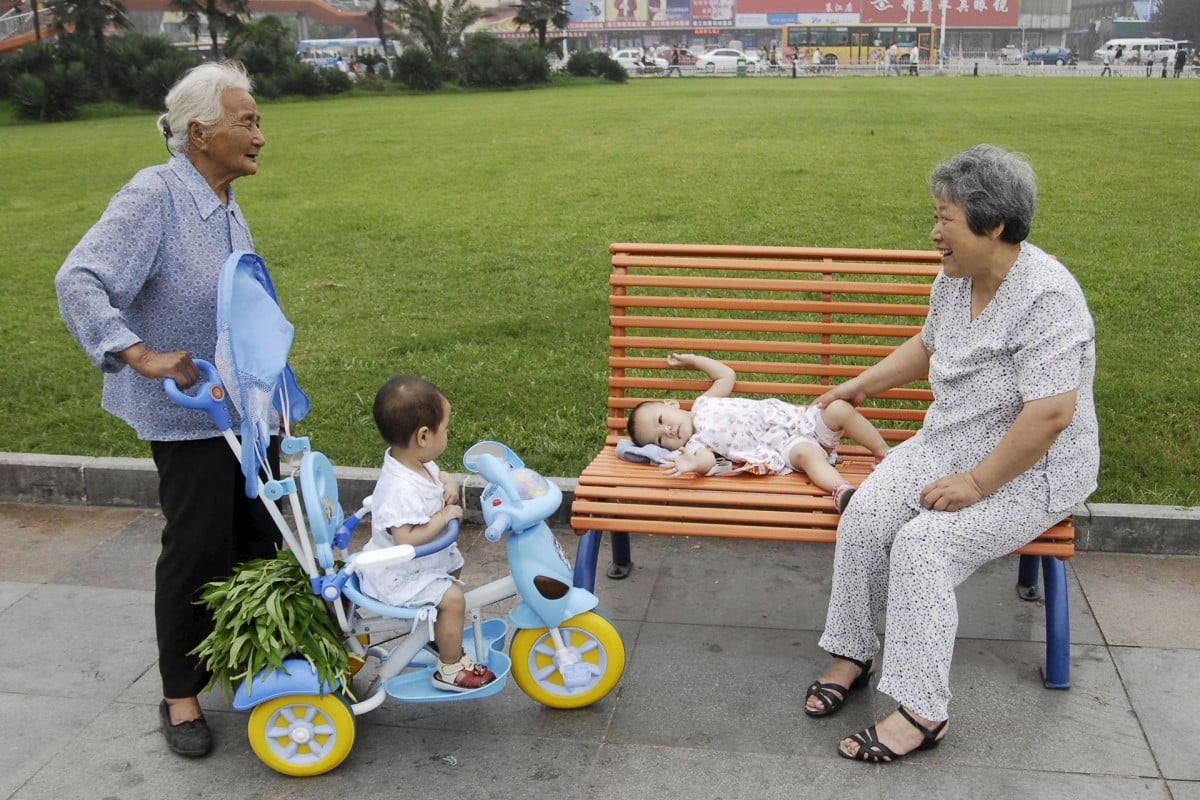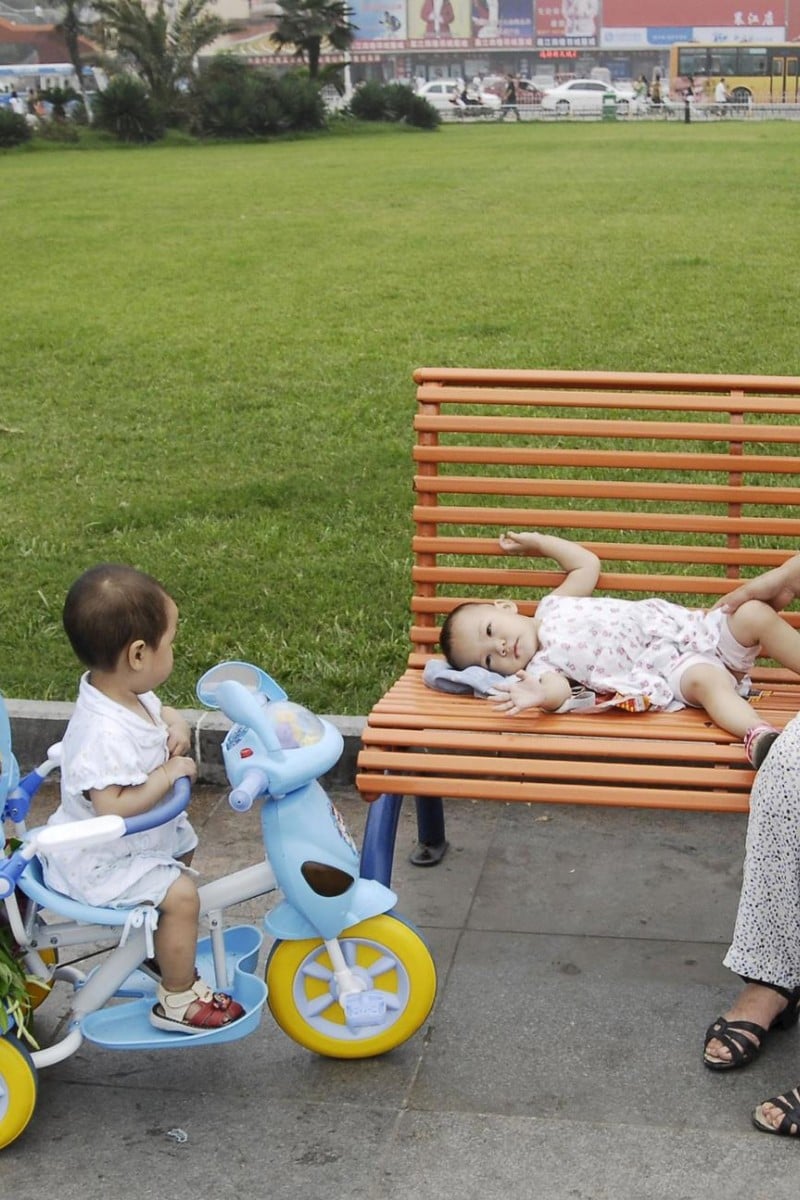The mainland has ended its controversial one-child policy, and all couples will now be allowed to have two children. But what does this mean for the country's economic and social development in the future?
 Grandmothers with their grandchildren in Hubei province.
Grandmothers with their grandchildren in Hubei province.News
The mainland announced the end of its hugely controversial one-child policy on October 29. The news comes after decades of strict, sometimes brutal, enforcement left the country with an ageing population and shrinking workforce that has heightened the challenges of slowing economic growth.
All couples will be allowed to have two children under the new policy.
But the new policy comes with its own rules. Couples need to apply for birth permits for their expected children, and pay fines if they have more than two children.
The one-child policy, introduced in 1978, restricted most couples to only a single child. It was enforced by a dedicated national commission with a system of fines for violators and often forced abortions.
Rural families were already allowed two children if the first was a girl, while ethnic minorities were allowed an extra child, leading some to dub it a "one-and-a-half child" policy.
In 2013, limited reforms of the policy allowed couples to have two children if either of them was an only child.
The public greeted the announcement cautiously, with many saying the change would only add to the already intense social and financial pressures attached to having children.
Staff writer
Issues
Do people want more children?
Cai Yong, a demographer at the University of North Carolina, in the US, said the two-child policy should have been implemented 10 years ago. He said many young rural residents who moved to cities are now facing acute economic pressures.
Swiss financial services company, Credit Suisse, estimates the cost of raising a child from birth to 18 years old at 23,000 yuan (HK$28,950) a year. This cost takes up 43 per cent of the average household income.
If the couple are only children, their financial burden will be greater as they will face the four-two-one phenomenon, a result of the one-child policy which sees the only child financially supporting two parents and two pairs of grandparents. So apart from supporting a child, couples have to deal with the costs of rising property prices, health care and ageing parents. This financial burden makes many couples reluctant to have larger families.
"Having children costs you a lot of other opportunities. The norm has changed to one or none," said Joan Kaufman, an expert on the mainland's population planning. "I don't think you're going to see a massive unleashing of this pent-up desire for children."
Will it help the economy?
Wen Bin, chief economist at China Minsheng Bank, said the relaxation of the one-child policy was a response to the ageing population.
The number of people aged 60 or older on the mainland rose last year by more than 10 million to 212.4 million, or 15.5 per cent of the total population, according to the National Bureau of Statistics (NBS).
Wen said the ageing population had led to falling labour supply, which would slow down economic growth. The huge, cheap labour supply has contributed to the mainland's economic strength, but this advantage has been weakening because of an ageing population.
This has also increased the government's financial burden as it has to spend more on pension schemes and medical services.
Increasing birth rates is one of the solutions to the shrinking work force and ageing population. The National Health and Family Planning Commission predicted the labour force, consisting of those aged from 15 to 59 years old, would rise by 30 million by 2050 thanks to the two-child policy. This increase should alleviate some of the pressures of supporting the elderly.
Seth Kaplowitz, a finance lecturer at San Diego State University, in the US, predicted a surging birth rate which would increase the demand for baby and education products. The increased demand for baby-related products will stimulate the mainland's economic development.
IG Group analyst, Bernard Aw, agrees. "China's decision to replace the 35-year-old one-child policy with two-child policy prompted investors to snap up any shares relating to babies - from diapers and body-care products to baby food and infant milk formula," he said.
Does this mean more girls?
The one-child policy has created a gender imbalance on the mainland. It is hoped that the two-child policy can mitigate this crisis.
According to the NBS, nearly 116 boys were born for every 100 girls last year. The NBS has estimated that Chinese men of marriageable age will outnumber women by 24 million in 2020. It will be difficult for many men to find wives.
"It's a reality that we have so many more men than women. Serious social problems, such as rape and assault, are more likely if men cannot find wives," said Xie Zhoshi, a professor at Zhejiang University of Finance and Economics.
The one-child policy has created other problems, too, such as sex-selective abortions or infanticide targeting girls, due to a traditional preference for boys.
Huang Rongqing, a retired demographer, said cases of forced abortion and sterilisation would likely decrease with the new policy.
But Wang Feng, a demographer at the University of California, Irvine, in the US, said the two-child policy will not have a huge impact on the country's demographics in the long term. "The long-term demographic effect is going to be negligible," Wang said.
Voices
"I'm an only child; I cannot afford school fees for two children and the cost of taking care of my ageing parents."
Peng Yajun, a 36-year-old Guangdong office worker
"I don't regard [the two-child rule] as progress, because it is still part of a wrong, unreasonable and absurd system. The birth policy itself violates human rights."
Liang Zhongtang, a demographer from the Shanghai Academy of Social Sciences
"It doesn't matter whether you have the second child or not, it shows people are being given greater freedom, so let's celebrate that first."
Commentary in the overseas edition of People's Daily newspaper
"The policy has averted 400 million births since 1980, saving scare food resources and helping to pull families out of poverty."
Communist Party leaders, as quoted by Reuters
Bonus point
20 million
The peak number of births per year on the mainland after the introduction of the two-child policy, estimated by the National Health and Family Planning Commission on October 30
What the people have to say
Beijing says the decades-old one-child policy has played a key role in the country's economic success, but has also inflicted pain on many people. Mainland residents tell us what they think of the change.
Beijing
"I'm not married so I'm not affected by the policy change. But even if I were, I would still have to consider whether or not to have a second child. It takes hundreds of thousands of yuan to have just one; how does anyone dare to have more children? It's a good thing the government has finally lifted the restriction, though. People in my home village will no longer have to get abortions or pay a big fine for violating the birth control policy. I think having just one child is too much of a risk for families and too much pressure for the only child." - Tom Zhang, Beijing resident
Shanghai
"It's not a bad idea, letting us have a second child. Unfortunately, it's too late. My son has been asking me for years if he can have a younger brother or sister. But he's already 10 years old and a sibling would be too young to communicate with him. I don't think the new policy will substantially increase the birth rate given the heavy financial burden a second child would have on average households. Unless the government rolls out more incentives to encourage families to have more children - say, subsidies for those with two - the policy change won't make a big difference at all. I would suggest the government come up with more detailed plans to increase education and medical resources so more families would be comfortable with having another child." - Ren Yun, 36, manager at a state-owned travel agency
"Frankly, I am too old to have a second child. When you plan to have a second baby, you have to seriously think about your health, income and future. It's not easy. For me, the focus will be on my son. Helping him grow up healthily is my priority. I would think most people my age would hold the same view." - Lu Qili, 41, manager at the Shanghai branch of a Hong Kong company
Guangzhou
"For myself and for my two-year-old son, it's better for him to grow up with a sibling. Before, we were worried about the penalty and household registration if we had a second child. He or she might not have access to the same level of education and medical services as our first child does." - Ma Jizhen, 30, housewife
Staff writer
Word Watch
Demography (noun)
Meaning: The study of populations and the evaluation of statistics, including birth rate, death rate, income, marriages and illnesses
Use it: China's demography is changing because of the declining birth rate and ageing population.
Demographer (noun)
Meaning: A person who studies or works with demographic information
Use it: Cai Yong, a demographer at the University of North Carolina, said the two-child policy was "too little, too late".
Demographic (adjective)
Meaning: Relating to the study of population structure
Use it: The demographic trends show that more parents prefer having one child.
